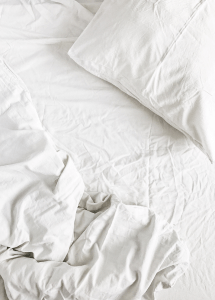This article was written by Dr. Jessica Hehmeyer, DC, MS, LDN, CNS. Dr. Hehmeyer is a Functional Medicine clinician through her firm Well-Empowered LLC. On a shared mission to introduce more women to functional wellness products and change philosophies, she is a frequent contributor and thought partner to Equilibria.
“Yes, I fall asleep easily and stay asleep. There is nothing wrong with my sleep. I just can’t seem to get my butt to bed!” – Erica, 38 years old
 Sound familiar?
Sound familiar?
If you’re anything like Erica, at 10pm, your second wind begins and so too does the juggling of household tasks, social media and online shopping until the clock strikes…Way. Too. Late.
This would all be fine if a 6:30am alarm wasn’t looming in your future.
If you’re ready to be done with this nightly charade and eager to master getting your butt to bed earlier, this conversation is for you! For most people who struggle to get their butt to bed, a combination of psychological, environmental and physiological factors are at play, each of which will be touched on in this article. My hope is that you walk away with a few actionable gems to apply that will help you get the 7-8 hours of sleep that will best serve your mental and physical health and vitality!
How do I get my butt to bed?
Ending “revenge bedtime procrastination”
 The Sleep Foundation defines revenge bedtime procrastination as, “the decision to sacrifice sleep for leisure time that is driven by a daily schedule lacking in free time”. When we don’t have enough free time in our lives, we are likely to grow resentful of our over-committed schedule. For many, this resentment is expressed by reclaiming downtime in the form of nightly binges on social media, online shopping, etc. While the reality of your work, family, and life commitments may not change, I invite you to look for small ways to reclaim time and engage in self-nurturing in ways that serve you best. A few solutions to consider…
The Sleep Foundation defines revenge bedtime procrastination as, “the decision to sacrifice sleep for leisure time that is driven by a daily schedule lacking in free time”. When we don’t have enough free time in our lives, we are likely to grow resentful of our over-committed schedule. For many, this resentment is expressed by reclaiming downtime in the form of nightly binges on social media, online shopping, etc. While the reality of your work, family, and life commitments may not change, I invite you to look for small ways to reclaim time and engage in self-nurturing in ways that serve you best. A few solutions to consider…
Create boundaries, not barriers, at work
Creating boundaries and imposing rules when it comes to work, such as no work email before 8:30am or after 6:30pm, or staying off of your work email entirely on the weekends, can help you reclaim your precious leisure time.
 Inserting small sips of pleasure throughout your days and weeks
Inserting small sips of pleasure throughout your days and weeks
Inserting soothing, pleasurable activities throughout your days and weeks, such as starting each day with 5 minutes of gentle stretches, pleasure reading before bed, or scheduling a weekly walk with a friend are just a few self-nurturing activities that can help you greatly in the long run.
Eliminating irresistibles (Abstaining vs. Moderating)
When it comes to bedtime and procrastination, begin recognizing which activities you’re able to do in moderation, and which activities you’d best avoid completely at night. When it comes to abstaining, identify the activities that you can’t find an “off” button for, such as when 15 minutes on Instagram invariably turns into an hour or two.
“It’s like chocolate ice cream. I don’t keep it in the house, because I learned a long time ago that I can’t have just one bowl!” – Anna
 Anna, a fellow expert at bedtime procrastination, created an “abstain” list that included TikTok, online shopping, and YouTube tutorials. She removed these apps from her phone, creating a barrier to use. Sure, she could open the browser on her phone or her computer to use them, but by making it harder to access these items, Anna had a much better chance at getting her butt to bed at the time she intended. Anna gave herself permission to access these items, on her computer, only on weekend days. This boundary worked well for her.
Anna, a fellow expert at bedtime procrastination, created an “abstain” list that included TikTok, online shopping, and YouTube tutorials. She removed these apps from her phone, creating a barrier to use. Sure, she could open the browser on her phone or her computer to use them, but by making it harder to access these items, Anna had a much better chance at getting her butt to bed at the time she intended. Anna gave herself permission to access these items, on her computer, only on weekend days. This boundary worked well for her.
Relieving sleep anxiety with hypnosis
Some people struggle to get their butt to bed because of nighttime anxiety. Unfortunately, research shows less sleep leads to increased anxiety, making it difficult to break the vicious circle. The good news, is we have a few great tools for this – one fan-favorite for reducing sleep anxiety is hypnosis. Even better, you can now complete hypnosis sessions anywhere thanks to the geniuses at Reveri! Three sessions per week, done any time of day, can meaningfully reduce your evening sleep anxiety.
Biohacking our circadian rhythm hormones
Another great tool for relieving sleep anxiety is by biohacking your circadian rhythm hormones. Your circadian rhythm is your internal 24-hour clock, governing when you feel awake and when you feel tired. The two key hormones involved in your circadian rhythm are cortisol (our “awake hormone” – we want this highest in the morning and lowest at night) and melatonin (our “asleep hormone” – we want this highest at night and lowest in the morning). The cool thing about these key circadian rhythm hormones is that we can biohack them to flow in our favor.
How can I biohack my circadian rhythm hormones?
 Strategic light exposure
Strategic light exposure
Morning light exposure guidelines:
- 20 minutes of natural light exposure, outside, between 8am and 10am. This meaningfully resets your cortisol production to favor the morning (true even on a cloudy day!)
- Natural light is always our first choice, but 20 minutes of a “happy lamp” will also benefit your circadian rhythm if getting outside in the morning is not an option.
Evening light therapy guidelines:
- Avoid bright lights after 10pm.
- If you must access electronic devices, use bluelight blocking glasses.
- Dim the lights as you begin getting ready for bed.
The caffeine curfew
 Caffeine suppresses the production of melatonin, with effects lasting up to 12 hours if you’re a slower metabolizer. To be sure caffeine doesn’t interfere with getting your butt to bed, honor a caffeine curfew: eliminate caffeine 10 hours before your desired “lights out”. Even if you don’t believe caffeine is impacting your sleep, I recommend a two week trial of a caffeine curfew. This will allow you to notice how your body responds. One woman who tried this noticed the biggest benefit from her caffeine curfew was decreased trips to the bathroom in the middle of the night! This alone was enough for her to continue honoring a caffeine curfew.
Caffeine suppresses the production of melatonin, with effects lasting up to 12 hours if you’re a slower metabolizer. To be sure caffeine doesn’t interfere with getting your butt to bed, honor a caffeine curfew: eliminate caffeine 10 hours before your desired “lights out”. Even if you don’t believe caffeine is impacting your sleep, I recommend a two week trial of a caffeine curfew. This will allow you to notice how your body responds. One woman who tried this noticed the biggest benefit from her caffeine curfew was decreased trips to the bathroom in the middle of the night! This alone was enough for her to continue honoring a caffeine curfew.
Supplements
 The biggest benefits around supplements and biohacking our circadian rhythm are typically seen at the end of the day. We can help dim cortisol production with supplements such as l-theanine, valerian root or phosphatidylserine, just to name a few. Because cortisol and melatonin exist on a teeter-totter (when cortisol goes down, melatonin goes up), these supplements allow the body to shift towards “melatonin-production” mode. Full spectrum CBD oil and GABA are other supplements that gently engage the “rest and digest” parasympathetic response, reducing stress and creating a state that naturally welcomes sleep. And of course, there are supplements out there that contain actual melatonin. In my experience, a high quality, low dose melatonin supplement can be very helpful for select people.
The biggest benefits around supplements and biohacking our circadian rhythm are typically seen at the end of the day. We can help dim cortisol production with supplements such as l-theanine, valerian root or phosphatidylserine, just to name a few. Because cortisol and melatonin exist on a teeter-totter (when cortisol goes down, melatonin goes up), these supplements allow the body to shift towards “melatonin-production” mode. Full spectrum CBD oil and GABA are other supplements that gently engage the “rest and digest” parasympathetic response, reducing stress and creating a state that naturally welcomes sleep. And of course, there are supplements out there that contain actual melatonin. In my experience, a high quality, low dose melatonin supplement can be very helpful for select people.
Sleep schedule consistency
No, it’s not sexy, but it does work! Studies show the more consistent you can be with when you wake up and when you go to bed (yes, including the weekends), the more your body will thank you with a healthy cortisol response in the morning and healthy melatonin production in the evening.
Learn more about the magic of sleep…
Learning about the magic of your body can provide the inspiration – and reverence – needed to create new and meaningful changes. Sleep is one of our body’s superpowers, impacting nearly every aspect of our health and wellbeing. If you are someone who makes changes best when you understand a subject on a deeper level, I encourage you to lean into this tendency. The below resources offer in-depth insight on the biology, physiology and benefits of sleep:
- “Why We Sleep” by sleep scientist, Matthew Walker
- The Kingdom of Sleep podcast interview, also with Matthew Walker
- Huberman Labs podcast on Tools for Optimizing Sleep and Sleep-Wake Time
 If you’ve struggled to get your butt to bed for many years, know that change takes time, perseverance, and trial and error. Rome wasn’t built in a day, but it did start with one brick. Choose one brick and then another and another – with practice and continued learnings over time, you’ll find yourself the master of getting your butt to bed!
If you’ve struggled to get your butt to bed for many years, know that change takes time, perseverance, and trial and error. Rome wasn’t built in a day, but it did start with one brick. Choose one brick and then another and another – with practice and continued learnings over time, you’ll find yourself the master of getting your butt to bed!
* This article and the ideas herein are the intellectual property of Dr. Jessica Hehmeyer dba Well-Empowered.



